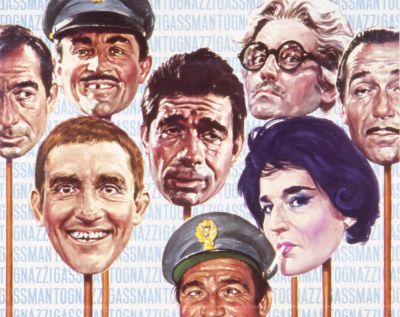
Short Italian Style. Part I (1952-1968)
Although they were not exclusively Italian, episode films had greater success in Italy than elsewhere. The reasons for this flourishing, which produced over two hundred films between the mid-fifties and the mid-seventies, can partly be found in the importance novellas and short stories had in Italian literature, in particular over the last two centuries (which the importance of Pietro Pancrazi’s 1939 anthology, Racconti e novelle dell’Ottocento, published by Sansoni, bears witness to). Reasons can also be found in the attention that a certain interpretation of Neorealism had for everyday things found in newspapers, seen as the possible starting point for more general reflection. It is not just coincidence that the first post-war Italian episode film is Paisan, one of the cornerstones of Rossellini’s Neorealism, which finds its civic and cinematographic strength exactly in its fragmentary episodic nature. A few years later, Blasetti would expressly seek his inspiration from Italian short stories to find ideas for his Altri tempi and Tempi nostri.
Despite such noble fathers, though, this current was not really appreciated by the press: it is well-known that it was torn to pieces by Tommaso Chiaretti, who defined it as “cinema for lazy people”. This was partly justified by the large number of quick and cunning productions which tried to reduce the financial risks by using the appeal of film stars (featuring many celebrities) and riding on the evolution of taste towards a coarser comic quality. Still, amongst many forgotten or forgettable titles, the episode film also offers directors and screenwriters the possibility of trying new narrative models closer to the essay than to the novel, or to combine different languages such as television or advertising, or to exploit less common genres such as horror – or even to try out, protected by the all-inclusive label of Italian comedy, the possibility of discussing controversial issues (like homosexuality) or taboos (like divorce).
Critics have only recently started to appreciate such a rich quality (after the fundamental essays by Micciché and Bruni, we have the more analytical studies by Marco Rossitti and Alice Autelitano), which seem to deserve such attention that we had to stop with the year 1968, leaving to a future programme the task of covering the later years. And we had to painfully leave out many titles, sometimes because of the lack of preservation of our heritage (we are sorry we could not present Il censore, with Rascel, from Gran varietà by Paolella), sometimes because we chose to select only one title from each director (so, with Pasolini we chose What are the Clouds? instead of the more famous La ricotta). We are nonetheless sure that there will be many pleasant surprises.
Despite such noble fathers, though, this current was not really appreciated by the press: it is well-known that it was torn to pieces by Tommaso Chiaretti, who defined it as “cinema for lazy people”. This was partly justified by the large number of quick and cunning productions which tried to reduce the financial risks by using the appeal of film stars (featuring many celebrities) and riding on the evolution of taste towards a coarser comic quality. Still, amongst many forgotten or forgettable titles, the episode film also offers directors and screenwriters the possibility of trying new narrative models closer to the essay than to the novel, or to combine different languages such as television or advertising, or to exploit less common genres such as horror – or even to try out, protected by the all-inclusive label of Italian comedy, the possibility of discussing controversial issues (like homosexuality) or taboos (like divorce).
Critics have only recently started to appreciate such a rich quality (after the fundamental essays by Micciché and Bruni, we have the more analytical studies by Marco Rossitti and Alice Autelitano), which seem to deserve such attention that we had to stop with the year 1968, leaving to a future programme the task of covering the later years. And we had to painfully leave out many titles, sometimes because of the lack of preservation of our heritage (we are sorry we could not present Il censore, with Rascel, from Gran varietà by Paolella), sometimes because we chose to select only one title from each director (so, with Pasolini we chose What are the Clouds? instead of the more famous La ricotta). We are nonetheless sure that there will be many pleasant surprises.
(Goffredo Fofi and Paolo Mereghetti)
Programme curated by Paolo Mereghetti and Goffredo Fofi
Documenti
Notes on films (from the festival catalogue)
Tipo di File: PDF Dimensione: 4.07 Mb










